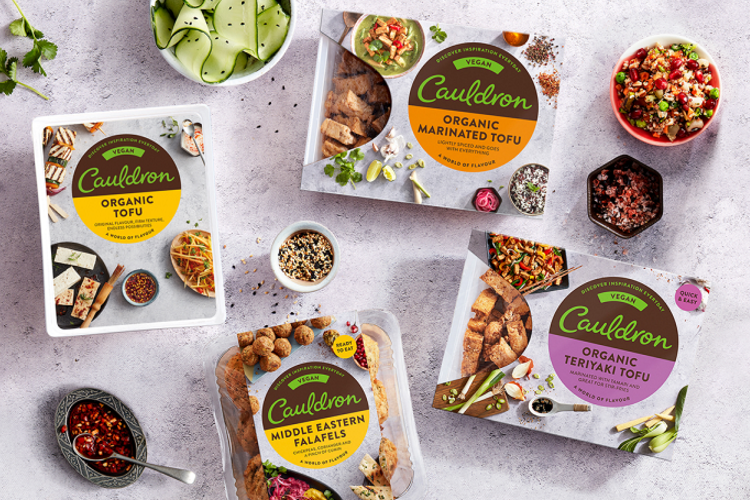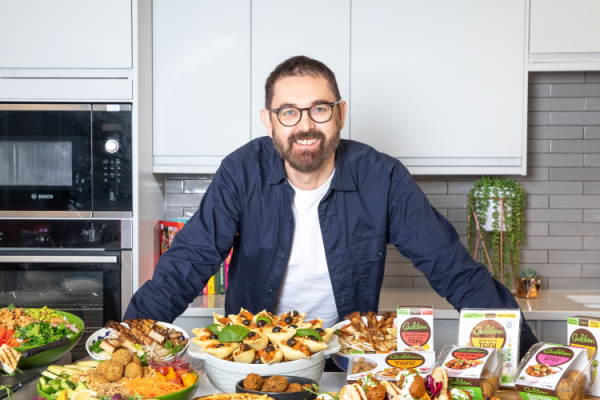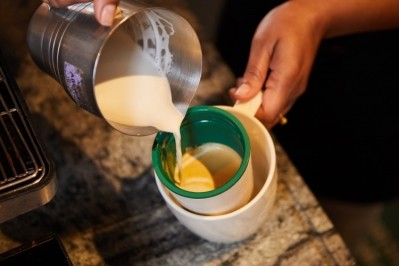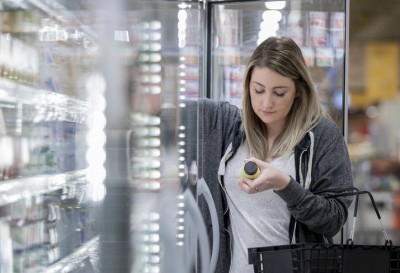Cauldron talks carbon neutral certification: ‘Plant-based alternatives should also seek to minimise their impact on the environment’

As part of a £3m investment, Cauldron Foods became the first UK meat-free brand to achieve carbon neutrality across its entire portfolio this month.
Working alongside carbon reduction experts at ClimatePartner, Cauldron has undertaken a number of measures that avoid, reduce and offset the emissions created in the production of Cauldron products.
“We’re so proud to be the first in the category to achieve carbon neutral status on every single one of our delicious Cauldron products, through our work with ClimatePartner,” said Cauldron Head Tom Lindley.
Eliminating, mitigating and offsetting
Cauldron said it has been as ‘holistic as possible in our measurement’, considering the carbon emissions across the lifecycle of its product from raw materials all the way to end-of-life recycling or disposal of the packaging. The only exception made was the usage phase because it differs widely from customer to customer—depending on what method they use to cook the product, the company said.
“Our calculation covers raw materials, manufacture, transport, distribution and disposal to make Cauldron products only,” Lindley told FoodNavigator. “On top of that, we also add a 10% margin for any emissions non attributable to products to make sure our calculation is as close to the actual footprint as possible.”
Lindley explained that, within its reduction efforts covering Cauldron’s operations, investments in renewable electricity were a ‘key’ lever to reduce the group’s footprint. “The key highlight in our reduction is the use of renewable electricity in production, helping to reduce the electricity consumption of all Cauldron products to below 5% of the final footprint.”
The brand, owned by Monde Nissin Corp – which also owns Quorn Foods, has also undertaken footprinting work in its supply chain, which accounts for the largest proportion of carbon emissions. “For our products’ carbon footprint, the biggest impact lies on the raw materials and packaging,” Lindley elaborated.
The business chief said that Cauldron has ‘always’ strived to make its products more sustainable, with work including a commitment to the UK Plastics Pact. The company’s sourcing strategy also reflects this objective. “We use only sustainable soya, certified by ProTerra and bmtrada, to create our tofu and sausage. Also, currently 97% of all packaging is recyclable and 100% of our cardboard is PEFC/FSC certified,” he explained.
After reduction and avoidance investments have been prioritised according to the mitigation hierarchy, with offsetting used to cover currently unavoidable CO2 emissions.
Where Cauldron has been unable to reduce the emissions associated with its products, the group is relying on carbon offsets. This will be achieved via certified carbon offsetting projects to attain complete carbon neutral certified status, the company revealed. “We have worked with ClimatePartner to calculate our products’ carbon footprint, certify and offset them through carbon offset projects with international standards,” Lindley told us.
The four offset projects selected by Cauldron include: providing clean, safe and green cooking equipment for families in Nigeria; protecting land for smallholders in Brazil ‘instead of it being used for soy plantations’; woodland creation in the UK; and afforestation to support deforestation-free products in Nicaragua.
The move is part of Cauldron’s ongoing drive to become ‘net positive’ by 2030. “We understand our work will always be ongoing and we are continuing to improve, engage with our suppliers and reduce our footprint to reach our ambition,” the businesses chief explained. “This means that we will give more back to the environment than we use to create our tasty plant-based products.”
Consumer awareness at ‘all time high’
Cauldron’s efforts are accompanied by a full packaging and brand re-launch. An annual brand investment will include renewal of Cauldron’s official sponsorship of Veganuary in 2022, a sustained shopper marketing programme and a mass consumer PR, as well as a digital and social campaign reaching over 10.9 million consumers.
This investment signals the importance the brand attaches to becoming carbon neutral as communications story.
“Consumer awareness around the climate crisis is at an all-time high, so there’s no better time to be making these steps. Eating more plant-based foods and less meat and dairy is one of the best and easiest ways that everyone can do their bit for the environment, by reducing their individual carbon footprint,” Lindley argued.
“By purchasing goods that are carbon neutral, the consumer can be assured that the business is taking climate action and putting themselves in the limelight for scrutiny on their reduction strategies. This should never replace the need to reduce our footprint in the first place and consume less.”
However, he insisted, plant-based brands can’t rely on their sustainability halo – carbon action needs to be taken by producers in this category as well. “We believe that the plant-based alternatives should also seek to minimise their impact on the environment,” he contended.
Lindley suggested that Cauldron’s efforts will not only resonate with existing Cauldron shoppers, who he described as ‘more tuned into environmental issues than the general population’. He believes it will expand the brand’s appeal to environmentally aware plant-based consumers with the potential to drive incremental growth in the category by attracting new consumers to plant-based. “This new carbon neutral message will build loyalty, appeal to the environmentally aware and attract new customers,” he predicted.
“We’re going to keep working hard to inspire and influence change, creating a better future for our wonderful planet.
“Our planet deserves the best and we’re urging everyone to become more aware of our collective responsibility to take better care of it, and do their bit.”
















